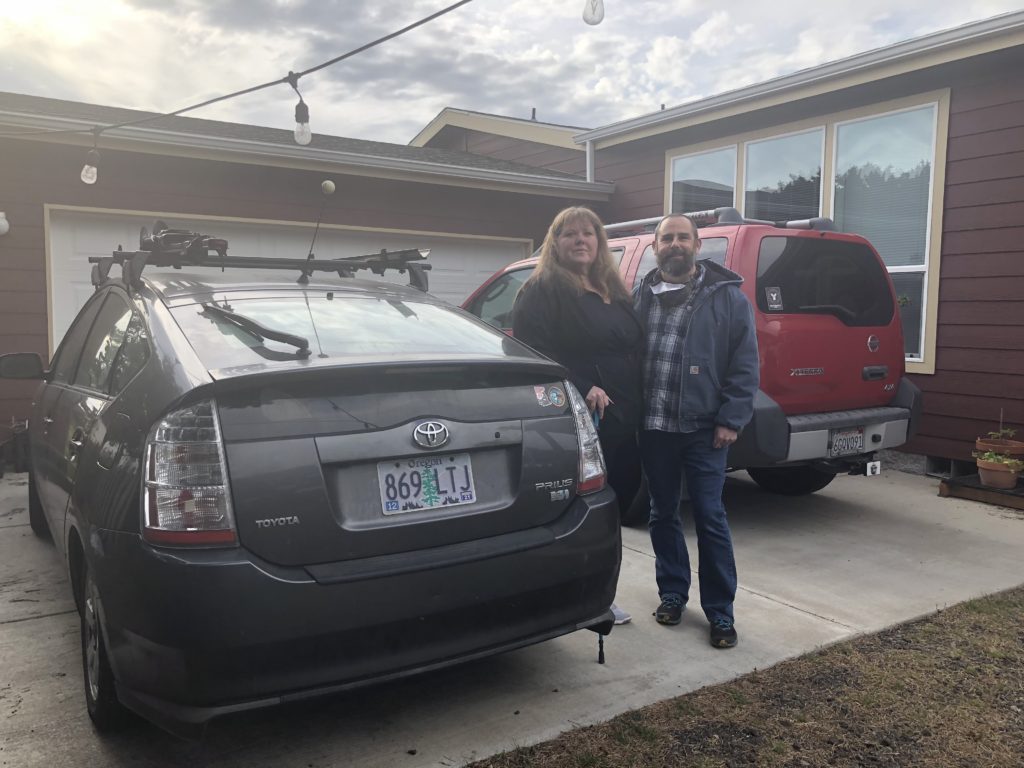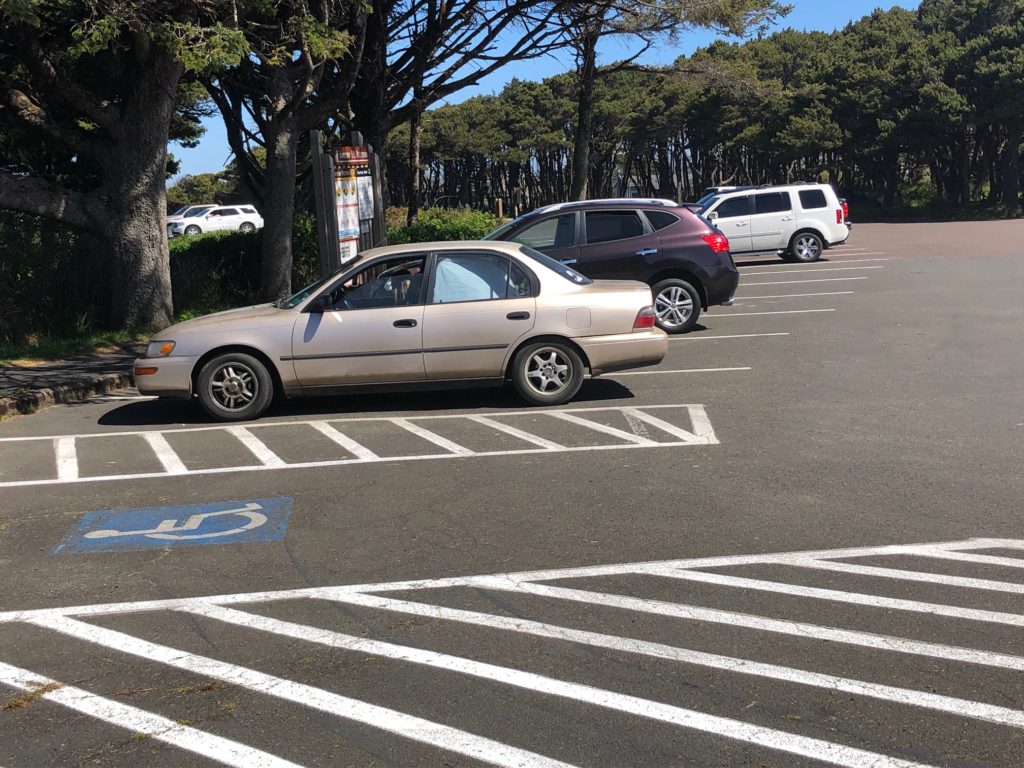
By CHERYL ROMANO/YachatsNews.com
For the criminally-minded, the recent travails of a Yachats couple set up a “perfect storm” of opportunity.
As warmer weather boosts those opportunities and brings more people and vehicles to the area, police along the central Oregon coast offer prevention tips that boil down to “Think like a thief.”
That thinking eluded Dan and Karen Bertenthal when they returned home late one April night from a nine-week stay in California for her cancer radiation treatment. Their Toyota Prius held $440 in cash, a blank check for emergencies, Karen’s prescription medicines, and, on that night, her wallet containing a debit card, credit card, Social Security card and driver’s license.
They arrived home weary and too late to deposit the cash. Karen ventured out to C&K Market for supplies.
Arriving at the market from their Driftwood Lane home, Karen extracted a Visa card from her wallet, which was in the glove box, and pulled out the hiking stick that helps her walk. Once home, she was juggling a bag of groceries and the hiking stick, and “I simply forgot that my wallet was in the glove box.”
Her wallet had sat on the couple’s kitchen counter for over a year, unused since she had to stop driving. Since she had just recently resumed short-distance driving, “It was a brand new thing for me to start getting out again,” she said.
That’s all it took — one instance of understandable forgetting — for thieves to enter the unlocked car in the driveway, rifle the unlocked glove box, and get away with a score that totaled $1,700 in cash and fraudulent debit card purchases.
That break-in — also called a “car prowl” or “car clout” — was one of up to seven that occurred that night in Yachats, according to the Lincoln County Sheriff’s Office. Weeks later, the couple say they have spent “hours and hours” dealing with banks to get the fraudulent purchases reimbursed and new cards issued, plus the time to replace the driver’s license and Social Security ID.
“It was the perfect storm,” Karen Bertenthal said of that awful night.
“As careful as you think you are you only have to slip up once, and it could be the wrong time,” cautioned Dan Bertenthal.
Neither of the couple believe they are naïve. She has worked as a credit manager; he’s a research epidemiologist. “We know better,” said Karen Bertenthal.
Crime rises as temperatures do
At this time of year, even those who know better are more likely to be victims of car and home break-ins and property theft.

“Crime does increase as weather gets warmer,” says sheriff’s Deputy Zach Landry, who responded to the spate of Yachats break-ins.
“A lot of people are visiting the coast, and a lot of people know people are visiting,” he said. “Thieves are fairly smart; in the world we live in, you can’t leave your home or your car unlocked.”
Since a major highway slices through Yachats, the town’s location can appeal to criminals. “Highway 101 is an easy and fast route in and out of town, and that’s always preferred by thieves,” Landry said.
Much of Yachats falls within the jurisdiction of the sheriff’s office, while U.S. Highway 101, state parks and ocean beaches are covered by the Oregon State Police. Those parks, beaches, viewing areas and highway pullouts can be prime territory for car break-ins.
“Every summer, we go through these spates of having people break into cars,” said Lt. Brian Tucker, commander of the state police office in Newport.
The usual trigger? Time, he said.
“People think, ‘I’m just going to run down there and look at the ocean real quick’,” Tucker said. “I tell people not to abandon caution just because they’ll be gone for a little while. You have to protect yourself.”

Keeping cars, homes, property safer
What does “protecting yourself” look like, when it comes to cars, property and homes? Interviews with Landry and Tucker, plus advice from the Newport Police Department, yields this advice:
CAR SECURITY
Wherever your travels take you, keep valuables (cellphones, tablets, cameras, anything a thief would find attractive) out of sight — and lock your car. “Don’t leave anything in view,” said Tucker.
But that doesn’t mean waiting ‘til you arrive at the beach or pullout to transfer goods to your trunk.
“If you know you’re going anyplace with a public parking area, leave your valuables at home or in your hotel or rental,” said Landry. If that isn’t feasible, move the items to your vehicle’s trunk before you depart.
“People prey on people they see putting stuff in their trunks — they’re targets of opportunity,” he said. “You never know who’s watching.”
In his personal vehicle, Landry has a lockbox for the center console to hold valuable items. “The chances of a break-in drop significantly if nothing of value is visible,” he said. “Locks keep honest thieves honest.
“If someone wants to get into a vehicle, they will,” the deputy said, but “If the vehicle is locked, you’re buying yourself more time.”
The would-be thief “will have to break a window and make noise,” and may decide the risk is greater than the potential reward.
Every vehicle hit that April weekend in Yachats were unlocked. And the incidents didn’t take place in public areas — they were on residential streets or in driveways.
MAIL SAFETY
Mail left on car seats can open the door to crime, too.

“Think of mail as just as valuable as a cellphone or wallet,” said Tucker.
While many Yachats residents receive mail through a Post Office box, the street address sometimes does appear as well — and that includes packages.
Why is knowing your name and address a big deal?
“For one thing, people can know where you live, and figure that if you’re driving a nice car, that could mean a nice house,” said Tucker. “They can start casing the house.”
They can also be scouting for checks or credit card statements to commit fraud or identity theft.
The solution is simple, said Landry — if you have to leave mail and packages in your car, flip them over so the address labels are concealed.
PROPERTY THEFT and BURGLARIES
On the night of the Yachats car prowls, the losses included landscaping tools swiped from a truck parked on West Third Street. Police know that anything portable can be ripe for theft — whether from a vehicle, porch or yard.
“Lawnmowers, bicycles, garden tools — put them away when you’re done,” said Tucker. “If you’ve got a shed or anyplace to store those things, use it — a fence isn’t going to keep out the motivated burglar.”
According to Newport police, a home burglary occurs every 15 seconds in the United States, and the average time to break in is under one minute. To help avoid becoming a burglary victim, the department offers these suggestions:
- Be a visibly nosy neighbor. Let anyone you do not recognize walking the neighborhood or sitting in a parked car see you watching them. Note down license plate numbers, and call police non-emergency lines if you see suspicious activity.
- When you’re going away, use timers to switch lights on and off at random intervals, and ask a neighbor to keep an eye on your home and collect any deliveries that might arrive.
- Walk around your home to determine where your security is most vulnerable — such as a window open in a secluded spot. Consider keyed window locks, deadbolts on doors, and removing large shrubs (convenient hiding places) close to the home.
- Motion-activated security cameras can be powerful deterrents to crime, along with accompanying signs and stickers. If you opt for a fake camera, don’t use cheap plastic versions with flashing lights — home burglars can easily identify these. Fake security stickers aren’t effective, either.
- Motion-activated lights can be very effective, but be sure they don’t shine on adjacent properties.
- Finally, don’t hesitate to call 911 if you’ve been victimized by crime or see something suspicious.
“This is our job,” said OSP’s Tucker. “We never want anyone to feel they shouldn’t call. This helps us establish a pattern to know what to look for. Chances are, if you see suspicious activity, it isn’t the first or only time someone is involved in crime.”
For the Bertenthals, the crime that occurred in their driveway has more than just changed their security habits.
“We double and triple check all the locks around our home and cars, and put our cars in the garage,” said Karen Bertenthal.
But more than the financial loss and the time spent figuratively mopping up, the break-in has stolen something else: “It took away the innocence, the feeling that you’re safe from everything here,” she said.


